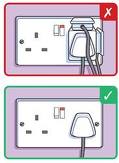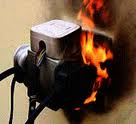- Electrical appliances cause a large number of domestic fires every year.
- Make sure that all electrical appliances are properly maintained and installed by a qualified person.
- Never overload electric sockets as it is a major fire hazard.
- Don’t run flexes under carpets or rugs where they can be damaged.
- Contact an electrician if cables are worn or damaged or simply replace the item.
- Avoid leaving them operating overnight. If you intend to leave them operating overnight then they should be in rooms separated from the escape route by a closed door.
- If the event of a fire turn off the power at the main isolation switch if this can be done safely without delaying the escape.

Never overload electrical sockets
Electric Blankets
- Make sure that your electric blanket has a British Standards Kitemark on the label.
- Make sure that it has an overheat protector to prevent the blanket from overheating.
- Regularly check the blanket for wear and tear particularly the electric leads and plug.
- Never use a blanket that has damage or scorch marks on it.
- Keep the blankets dry and when storing for the summer roll them up to prevent creasing.
- If an electric blanket gets wet, dry it completely before using it again.
- Tie the electric under blankets to the mattress to prevent creasing.
- Adhere strictly to the manufacturer’s instructions.
- Never use hot water bottles and electric blankets together.
- Make sure that all electric leads hang freely over the side of the bed.
- Unplug the blanket before getting into bed unless it is designed for all night use.
- Never use an over blanket under or an under blanket over.
- If in doubt about the condition of your electric blanket have it checked or replaced.
Wiring
If you notice any of the warning signs below, ask a qualified electrician to check your wiring.

- Hot plugs and sockets.
- Fuses that blow for no obvious reason.
- Lights that flicker.
- Brown scorch marks on sockets, plugs and fuse boxes.
Portable Heaters
- Always position heaters so the back is against a wall and they’re facing the room. If possible, secure them to the wall to prevent them from falling over.
- Don’t place heaters near curtains or furnishings, and never use them for drying clothes.
- Leave your heater on the floor, not on a chair, kitchen counter, table or elevated surface. This makes the heater more susceptible to being knocked over and starting a fire.
- Leave your heater in a dry place.
- Switch heaters off if you’re not in the room, and also when you go to bed.
- Keep portable heaters away from draughts
- Never move a portable heater when it is in use.
- Never use a portable heater for drying clothes.
- Check flexes for signs of wear regularly and replace if necessary.
- Replace blown fuses with one of the correct rating.